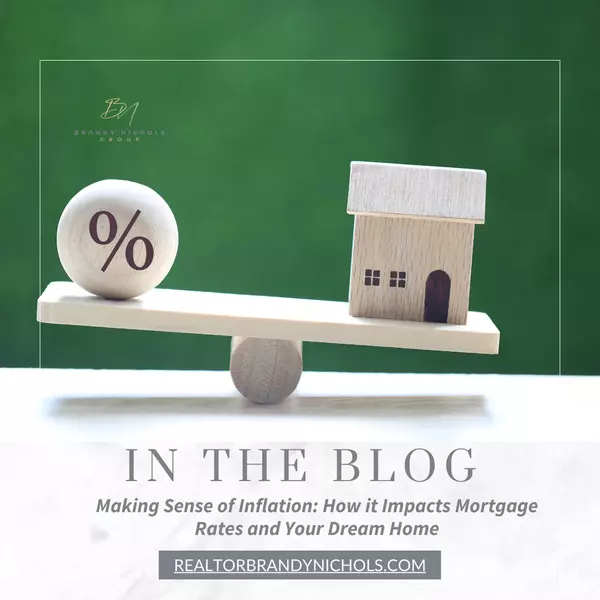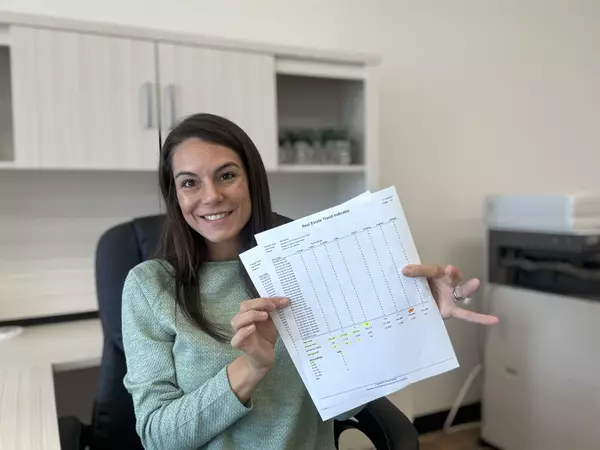

Magnolia Dreams: The Southern Guide to Pre-Approval
Magnolia Dreams: The Southern Guide to Pre-Approval Before you set off on your exciting journey to find your dream home, there's a crucial step that can give you a major advantage: getting pre-approved for a mortgage. It's like having a secret weapon in your pocket, providing you with the power and confidence to navigate the market smoothly. Know Your Budget: Pre-approval gives you a clear understanding of your budget right from the start. With a lender's evaluation of your financial situation, you'll receive a pre-approval letter specifying the maximum loan amount you qualify for. This knowledge allows you to focus on homes that fit within your financial capabilities, saving you time and ensuring you stay within your means. Increased Negotiating Power: Walking into the real estate market with pre-approval gives you a significant advantage when negotiating with sellers. It demonstrates your seriousness and financial readiness to make a purchase. Sellers are more likely to take your offer seriously, giving you leverage in multiple offer situations and potentially improving your chances of securing a better price or more favorable terms. Speed and Efficiency: In a competitive housing market, time is of the essence. Pre-approval allows you to act swiftly when you find the right home. Rather than having to secure financing after making an offer, you can proceed confidently, knowing that your financial backing is already in place. This speed and efficiency can make a significant difference, especially when desirable properties receive multiple offers. Avoid Disappointment: Pre-approval helps you avoid the disappointment of falling in love with a home only to discover later that you can't secure financing for it. By addressing any potential financing obstacles early on, you can focus your energy on homes that are within your reach. This ensures that your efforts are spent on properties where you have a higher chance of successfully closing the deal. Peace of Mind and Confidence: Perhaps the most valuable aspect of pre-approval is the peace of mind and confidence it brings. Knowing that a lender has reviewed your financials and deemed you eligible for a mortgage provides reassurance throughout the homebuying process. You can make informed decisions, navigate negotiations with confidence, and proceed with certainty, resulting in a smoother and more satisfying experience. Pre-approval is a powerful tool that gives you an edge in the homebuying process. Taking the time to get pre-approved before you start your home search sets the stage for a successful and enjoyable journey. So, make sure to secure your pre-approval and unlock the advantages it brings to your homebuying experience.
Read More

Home Inspections vs. Home Appraisals - What You Need to Know
Home Inspections vs. Home Appraisals - What You Need to Know When it comes to buying or selling a home, there are a few steps that may seem similar but serve different purposes. Home inspections and home appraisals often fall into that category. Here we'll break down the distinction between home inspections and home appraisals, helping you understand their unique roles in the real estate process. The Purpose: Home inspections and home appraisals have distinct purposes. A home inspection focuses on evaluating the property's condition, identifying any potential issues or defects. On the other hand, a home appraisal determines the fair market value of the property, providing an unbiased estimate of its worth. Scope of Examination: During a home inspection, a licensed inspector thoroughly examines the property, assessing its structural elements, systems, and overall condition. The inspection report highlights any existing or potential problems, giving buyers a comprehensive understanding of the property's condition. Parties Involved: Different parties are involved in the processes of home inspections and home appraisals. Home inspections are typically arranged and paid for by the buyer. The buyer hires a qualified inspector to assess the property and provide a detailed report. The inspection report helps buyers make informed decisions, negotiate repairs, or request a price adjustment. In contrast, a home appraisal primarily focuses on determining the value of the property. An appraiser considers various factors, such as comparable sales, location, amenities, and condition, to establish an unbiased estimate of the property's worth. Home appraisals, on the other hand, are typically arranged by the lender as part of the mortgage approval process. The appraiser is an independent professional who determines the fair market value of the property. The appraisal report helps the lender assess the risk and ensure that the loan amount aligns with the property's value. Home inspections and home appraisals play crucial roles in a real estate transaction. A home inspection helps buyers understand the property's condition, negotiate repairs, and make informed decisions. A home appraisal assists lenders in determining the property's value, ensuring the loan amount matches its worth. By understanding the difference between these processes, buyers and sellers can navigate the real estate journey with confidence and clarity.
Read More

Understanding Closing Costs When Purchasing Your Dream Home
Understanding Closing Costs When Purchasing Your Dream Home Congratulations, homebuyer-to-be! As you embark on the exciting journey of purchasing a new home, it's essential to be prepared for one critical aspect of the process: closing costs. These costs are additional expenses that arise at the end of the homebuying journey, and they can have a significant impact on your budget. In this article, we'll shed light on closing costs, what they encompass, and what to expect when it's time to seal the deal on your dream home. What are Closing Costs? Let's start with the basics, y'all. Closing costs refer to the fees and expenses associated with finalizing a real estate transaction. They typically include a variety of charges from various parties involved in the homebuying process, such as lenders, attorneys, and title companies. It's important to note that closing costs can vary depending on factors like location, property type, and loan amount. Breakdown of Common Closing Costs: Now, let's dive into what you can expect to encounter when it comes to closing costs. Here's a breakdown of some common expenses you may encounter: Loan Origination Fees: This covers the lender's administrative costs for processing your loan application. Appraisal Fees: These cover the cost of assessing the property's value to ensure it aligns with the loan amount. Title Insurance: This protects the lender and buyer against any legal claims or issues related to the property's ownership. Escrow Fees: These cover the costs associated with holding funds and necessary documents during the closing process. Attorney or Closing Agent Fees: If an attorney or closing agent is involved in the transaction, their fees may apply. Estimating and Budgeting for Closing Costs: It's crucial to be prepared for closing costs, as they can add up to a significant sum. Before closing day arrives, it's wise to estimate your potential closing costs and factor them into your overall budget. Your lender or real estate agent can provide you with an estimate based on your specific circumstances, allowing you to plan accordingly and avoid any surprises. Negotiating Closing Costs: While some closing costs are non-negotiable, there may be opportunities to discuss and potentially reduce certain fees. For instance, you can shop around and compare offers from different service providers, such as title companies or insurance providers, to find the best rates. Additionally, you can discuss closing cost credits or ask the seller to contribute toward the closing costs as part of your negotiations. The Big Day: Closing Day: When the day finally arrives to sign those papers and close the deal, it's important to review your closing disclosure statement and understand the breakdown of the closing costs. Take your time to read and ask questions about any charges you may not understand. Your real estate agent, lender, or closing agent will be there to guide you through the process and ensure everything is in order. Closing costs are an integral part of the homebuying process that shouldn't be overlooked. By understanding what closing costs entail and budgeting accordingly, you can be better prepared for this financial aspect of purchasing a home. Remember to discuss estimates with your lender, consider negotiation opportunities, and review all documents thoroughly on closing day. With this knowledge in hand, you'll be ready to navigate the exciting path to homeownership with confidence!
Read More

Making Sense of Inflation: How it Impacts Mortgage Rates and Your Dream Home
Making Sense of Inflation: How it Impacts Mortgage Rates and Your Dream Home Inflation is a crucial economic factor that affects various aspects of our lives, including the real estate market. Mortgage rates, in particular, are greatly influenced by inflation. For prospective homeowners in Louisiana, understanding the relationship between inflation and mortgage rates is essential for making informed decisions. In this blog post, we will delve into the impact of inflation on mortgage rates in Louisiana and explore how these dynamics can affect both buyers and sellers in the state's real estate market. Understanding Inflation and Mortgage Rates: To comprehend the link between inflation and mortgage rates, it's important to first define these terms. Inflation refers to the general increase in prices of goods and services over time, eroding the purchasing power of a currency. On the other hand, mortgage rates represent the interest charged on a home loan, determining the cost of borrowing money for a property purchase. The Relationship between Inflation and Mortgage Rates: Inflation plays a significant role in shaping mortgage rates. Generally, when inflation is high, mortgage rates tend to rise as lenders compensate for the diminishing value of money over time. Conversely, when inflation is low, mortgage rates tend to be more favorable as lenders adjust to the relatively stable purchasing power of the currency. We will explore the specific impact of inflation on mortgage rates in Louisiana and its implications for buyers and sellers. Effects of Inflation on Homebuyers: High inflation can lead to increased mortgage rates, making borrowing more expensive for potential homebuyers in Louisiana. We will discuss how rising mortgage rates affect affordability and the overall purchasing power of buyers. Additionally, we will explore strategies that buyers can employ to mitigate the impact of inflation on their mortgage rates. Implications for Sellers and the Real Estate Market: Inflation-driven fluctuations in mortgage rates can impact the demand for homes in Louisiana. We will examine how changes in mortgage rates influence buyer behavior and affect the pricing and sales of properties. Sellers can benefit from understanding these dynamics and adjusting their strategies accordingly. Inflation has a significant impact on mortgage rates in Louisiana, affecting both buyers and sellers in the real estate market. By understanding the relationship between inflation and mortgage rates, prospective homeowners can make informed decisions about their mortgage options. Sellers, on the other hand, can adapt their strategies to accommodate changing buyer behavior influenced by inflationary pressures. Monitoring inflation and its effects on mortgage rates will empower individuals to navigate the real estate landscape more effectively in Louisiana.
Read More
Categories
Recent Posts










